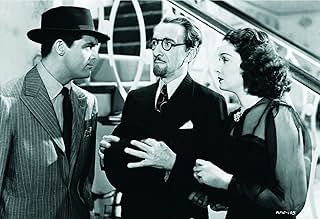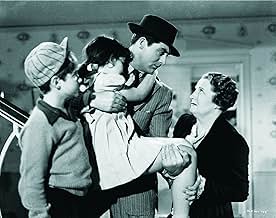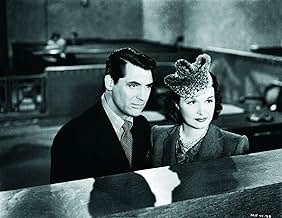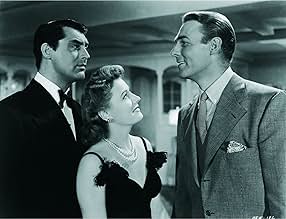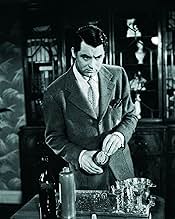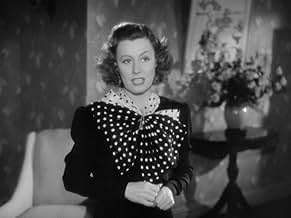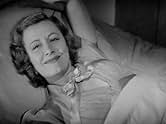Missing for seven years and presumed dead, a woman returns home on the very day that her husband remarries.Missing for seven years and presumed dead, a woman returns home on the very day that her husband remarries.Missing for seven years and presumed dead, a woman returns home on the very day that her husband remarries.
- Nominated for 3 Oscars
- 3 wins & 3 nominations total
Jean Acker
- Postponed Case Witness
- (uncredited)
Murray Alper
- Yosemite Bartender
- (uncredited)
Leon Belasco
- Waiter - Pacific Club Poolside
- (uncredited)
Joe Cabrillas
- Phillip
- (uncredited)
Bill Cartledge
- Page Boy Paging Burkett
- (uncredited)
Chester Clute
- Shoe Salesman
- (uncredited)
Corky
- Corky the Dog
- (uncredited)
Featured reviews
At first, I must say that this movie doesn't exceptionally stand out from the whole bunch of screwball comedies produced in the times of Great Depression in the USA. The first part of My Favorite Wife may be even called boring, due to a very slow narrative process and lack of any specific action. Of course, it's just an introduction to the plot and the viewer has to believe that in a moment something extraordinarily funny and crazy will happen. And it does, along with the entrance of, fantastic as always, Irene Dunne. The story presented in this movie is so ridiculous that it will make you laugh just reading about it.
It seemed like another regular wedding for Mr. Nick Arden (Cary Grant) and his new wife Ellen (Gail Patrick). His first wife is presumed dead after drowning somewhere far at sea seven years ago, and he wants to be form a happy relationship with a new woman. Guess what happens when Ellen Arden (Irene Dunne) suddenly shows up at their doorstep more alive than ever – all hell breaks loose and Nick becomes involved with two women at the same time. Additionally, his two wives (how grand it sounds) aren't particularly fond of each other and start to make Nick's life much harder than he imagined. And if this wasn't enough, somewhere on the road Nick meets Steve Burkett (Randolph Scott), a handsome man, with whom Ellen was stranded on a deserted island for seven long years. Level of jealousy goes through the roof, and the real 'fun' starts for all people involved in this ludicrous affair. Finally, Nick has to decide, who to choose, as it may seem that from a point of having two beautiful women at once he will ultimately be left all alone.
The movie provides a great amount of laughs, due to many amusing one-liners and gags, especially on the part of Cary Grant's perfect sense of humorous acting abilities. Every screwball film, in which he stars abruptly becomes much more entertaining, because of his irrefutable acting manners and charisma, so important for a funny leading man. And he does it differently every time. Even though the movies may seem similar, the portrayals of characters that he presents always have other specific comedic feels to it.
And the relationship that he forms with Irene is brilliant; you can sense that deep emotional attachment coming from their characters in every scene. Maybe seven years have passed, but the flame in their hearts still burns. They can't argue that their need to be together is so strong that it will surpass anything.
All in all, I can't call it My Favorite Screwball, but I certainly might recommend it to anyone, who is need of a light-hearted American comedy that may provide a positive shock in the sense of absurdity and amount of laughs that come with it.
It seemed like another regular wedding for Mr. Nick Arden (Cary Grant) and his new wife Ellen (Gail Patrick). His first wife is presumed dead after drowning somewhere far at sea seven years ago, and he wants to be form a happy relationship with a new woman. Guess what happens when Ellen Arden (Irene Dunne) suddenly shows up at their doorstep more alive than ever – all hell breaks loose and Nick becomes involved with two women at the same time. Additionally, his two wives (how grand it sounds) aren't particularly fond of each other and start to make Nick's life much harder than he imagined. And if this wasn't enough, somewhere on the road Nick meets Steve Burkett (Randolph Scott), a handsome man, with whom Ellen was stranded on a deserted island for seven long years. Level of jealousy goes through the roof, and the real 'fun' starts for all people involved in this ludicrous affair. Finally, Nick has to decide, who to choose, as it may seem that from a point of having two beautiful women at once he will ultimately be left all alone.
The movie provides a great amount of laughs, due to many amusing one-liners and gags, especially on the part of Cary Grant's perfect sense of humorous acting abilities. Every screwball film, in which he stars abruptly becomes much more entertaining, because of his irrefutable acting manners and charisma, so important for a funny leading man. And he does it differently every time. Even though the movies may seem similar, the portrayals of characters that he presents always have other specific comedic feels to it.
And the relationship that he forms with Irene is brilliant; you can sense that deep emotional attachment coming from their characters in every scene. Maybe seven years have passed, but the flame in their hearts still burns. They can't argue that their need to be together is so strong that it will surpass anything.
All in all, I can't call it My Favorite Screwball, but I certainly might recommend it to anyone, who is need of a light-hearted American comedy that may provide a positive shock in the sense of absurdity and amount of laughs that come with it.
This gets pretty good comic mileage out of the often-used 'Enoch Arden' (or, as here, 'Ellen Arden') idea of the long-lost spouse who returns to find his/her spouse now involved with someone else. Numerous movies have used it both for drama and for comedy, and in this case, the premise is adapted to the screwball comedy formula that was so popular for a time in the 1930s and 1940s.
The story starts by slightly revising the usual setup, with Irene Dunne as the formerly shipwrecked spouse, Cary Grant as the husband who has since become involved with another woman (Gail Patrick), plus Randolph Scott as a wild card in the relationships. Practically every stage of the story is highly implausible (probably deliberately so) but amusing, and it is generally left to the cast to make things work, which they usually do.
Grant usually seems quite at home in this kind of comedy, and he and Dunne work well together, depicting their characters' relationship with the kinds of intangibles that help make the whole scenario more believable. Patrick is always quite good as an elegantly icy rival to the heroine, and Scott also works well here in his role. Amongst the supporting cast, Granville Bates gets some very good moments as the grouchy judge.
For as far-fetched as the scenario seems at times, it works pretty well. The cast is strong enough to carry the weight, and it would have been hard to improve upon their combination of talents. It doesn't have quite the depth of comic variety or the subtlety of implied commentary that the best screwball comedies have, but it's an entertaining movie worth seeing.
The story starts by slightly revising the usual setup, with Irene Dunne as the formerly shipwrecked spouse, Cary Grant as the husband who has since become involved with another woman (Gail Patrick), plus Randolph Scott as a wild card in the relationships. Practically every stage of the story is highly implausible (probably deliberately so) but amusing, and it is generally left to the cast to make things work, which they usually do.
Grant usually seems quite at home in this kind of comedy, and he and Dunne work well together, depicting their characters' relationship with the kinds of intangibles that help make the whole scenario more believable. Patrick is always quite good as an elegantly icy rival to the heroine, and Scott also works well here in his role. Amongst the supporting cast, Granville Bates gets some very good moments as the grouchy judge.
For as far-fetched as the scenario seems at times, it works pretty well. The cast is strong enough to carry the weight, and it would have been hard to improve upon their combination of talents. It doesn't have quite the depth of comic variety or the subtlety of implied commentary that the best screwball comedies have, but it's an entertaining movie worth seeing.
After his shipwrecked wife is declared dead and he takes on a new wife, Grant's first wife resurfaces, rescued after seven years on an island. This reteaming of Grant and Dunne after their success with "The Awful Truth" is pretty funny for the most part, as Grant tries to solve the problem of one wife too many while dealing with jealousy after learning that Dunne had a male companion (Scott) on that island. The only complaint is that the laughs stop in the last quarter of the movie, which is rather uninteresting as the focus shifts from comedy to romance. Bates, who is hilarious as a flustered judge, died in July 1940 but managed to act in 12 films released that year!
A curious one that leaves a mildly bitter taste in the mouth. It's funny alright (but never hilarious), and the acting from - and chemistry between - Irene Dunne and Cary Crant is exquisite as always. But the film's fundamental problem is that none of the characters are particularly likable. Throughout the film three of the four main characters take their turn to behave despicably, yet the new wife - a woman who's merely unpleasant - is the villain of the piece; constantly the butt of jokes and fair game for ridicule even though she's done absolutely nothing to warrant it. At times it's like watching two spoilt brats from the Hamptons bullying their visiting second-cousin from the Bronx.
The script is also strangely stunted, best witnessed in the scenes before the judge. They really should have been classic screwball moments - the ingredients were there - yet between the lengthy silences and repetitive parrot-dialogue it falls almost completely flat. The gaping plot holes and poor script continuity can't be forgiven either, even allowing for the fact the film's seventy years old.
Don't get me wrong, I laughed, and I enjoyed myself, and I thought it was a decent film. It's just that the character's actions don't stand up too well under scrutiny.
The script is also strangely stunted, best witnessed in the scenes before the judge. They really should have been classic screwball moments - the ingredients were there - yet between the lengthy silences and repetitive parrot-dialogue it falls almost completely flat. The gaping plot holes and poor script continuity can't be forgiven either, even allowing for the fact the film's seventy years old.
Don't get me wrong, I laughed, and I enjoyed myself, and I thought it was a decent film. It's just that the character's actions don't stand up too well under scrutiny.
From the opening moments, when the big wooden doors part and usher us into a beautifully spare art deco courtroom with slanting shafts of sunlight enhancing the clean architectural lines, we know that this is going to be a deftly-made, elegant film. What follows does not disappoint us.
Attorney Nick Arden (Cary Grant) lost his wife Ellen in a shipwreck in the Pacific seven years ago. He has now decided to have her declared officially dead, so that he will be free to marry Bianca (Gail Patrick). The irascible judge eventually accedes to both the declaration and the marriage, and the newly-weds set off for a honeymoon in Yosemite. Meanwhile, who should turn up at the Arden residence, very much alive, but the long-lost Ellen? When she hears of the recent marriage, she heads straight for the honeymooners' hotel ...
"My Favourite Wife" is a fine example of those early Cary Grant farces, the ones in which he gawps with surprise, double-takes and mutters to himself as only he can. Irene smoke-gets-in-your-eyes Dunn is great as Ellen, unveiling a hitherto unsuspected gift for witty comedy. Scotty Beckett and Mary Lou Harrington come close to stealing the show as the Ardens' cute little kids. Randolph Scott is interestingly cast as Steve Burkett, the muscle-bound Adonis who spent seven years on the desert island with Ellen.
Some of the film's highlights are worth mentioning here, like the superimposition of Burkett performing gymnastic feats alongside Nick Arden's troubled face as he muses at his desk, conveying with economy the husband's jealous preoccupation. It is unfair to give away a film's jokes, but one gag which lose nothing in the telling is Ellen's outfit at the Yosemite hotel. She has been out of circulation for seven years, and she looks comically untrendy in her 1932 polkadots and lapels, and obtrusive hat. Watch for the derisive glances from the other hotel guests.
Such a light, charming piece of entertainment is hard to fault, but the film does have some shortcomings. Its central problem, which is not resolved, is what to do with Bianca. She married Nick in good faith and has done nothing wrong, yet she is neglected by Nick. Because there is no satisfactory way of dealing with her, she is simply dropped. Ellen's return from a watery grave after all those years would be a news story of international importance, but instead she arrives home having hitched a ride in a truck. Her entry into the country seems to have gone unannounced, even to her husband. The scene in which she persuades a shoe store clerk to pose as 'Adam' in front of Nick has enormous comic potential, but is abandoned after a few seconds. Nick's sleeping-in-the-attic scene is far too long for the humour it contains.
However, the film is a pleasant and very amusing romp, and such weaknesses as it contains do not detract from its appeal.
Attorney Nick Arden (Cary Grant) lost his wife Ellen in a shipwreck in the Pacific seven years ago. He has now decided to have her declared officially dead, so that he will be free to marry Bianca (Gail Patrick). The irascible judge eventually accedes to both the declaration and the marriage, and the newly-weds set off for a honeymoon in Yosemite. Meanwhile, who should turn up at the Arden residence, very much alive, but the long-lost Ellen? When she hears of the recent marriage, she heads straight for the honeymooners' hotel ...
"My Favourite Wife" is a fine example of those early Cary Grant farces, the ones in which he gawps with surprise, double-takes and mutters to himself as only he can. Irene smoke-gets-in-your-eyes Dunn is great as Ellen, unveiling a hitherto unsuspected gift for witty comedy. Scotty Beckett and Mary Lou Harrington come close to stealing the show as the Ardens' cute little kids. Randolph Scott is interestingly cast as Steve Burkett, the muscle-bound Adonis who spent seven years on the desert island with Ellen.
Some of the film's highlights are worth mentioning here, like the superimposition of Burkett performing gymnastic feats alongside Nick Arden's troubled face as he muses at his desk, conveying with economy the husband's jealous preoccupation. It is unfair to give away a film's jokes, but one gag which lose nothing in the telling is Ellen's outfit at the Yosemite hotel. She has been out of circulation for seven years, and she looks comically untrendy in her 1932 polkadots and lapels, and obtrusive hat. Watch for the derisive glances from the other hotel guests.
Such a light, charming piece of entertainment is hard to fault, but the film does have some shortcomings. Its central problem, which is not resolved, is what to do with Bianca. She married Nick in good faith and has done nothing wrong, yet she is neglected by Nick. Because there is no satisfactory way of dealing with her, she is simply dropped. Ellen's return from a watery grave after all those years would be a news story of international importance, but instead she arrives home having hitched a ride in a truck. Her entry into the country seems to have gone unannounced, even to her husband. The scene in which she persuades a shoe store clerk to pose as 'Adam' in front of Nick has enormous comic potential, but is abandoned after a few seconds. Nick's sleeping-in-the-attic scene is far too long for the humour it contains.
However, the film is a pleasant and very amusing romp, and such weaknesses as it contains do not detract from its appeal.
Did you know
- TriviaCary Grant and Randolph Scott, who play rivals in this film, lived together on and off between 1932 and 1944.
- GoofsWhen Ellen has her first hot shower in seven years, she wears a bathing cap rather than washing her hair in the shower.
- Quotes
Nick Arden: I came here with my wife... hum... my bride really. Now my wife, not my bride... my wife... Why should I bore you with details?
Hotel clerk: I won't be bored.
Nick Arden: Listen, it's just simple as A B C.
Hotel clerk: Don't tell me you got someone in B?
- Crazy creditsRather than the normal "The End" title as the movie concludes, "Good Night" is drawn in cursive handwriting.
- ConnectionsEdited into Marilyn: Something's Got to Give (1990)
- SoundtracksJingle Bells
(1857) (uncredited)
Written by James Pierpont
Played as part of the score when Cary Grant dons his Santa Claus costume
- How long is My Favorite Wife?Powered by Alexa
Details
- Runtime1 hour 28 minutes
- Color
- Aspect ratio
- 1.37 : 1
Contribute to this page
Suggest an edit or add missing content



